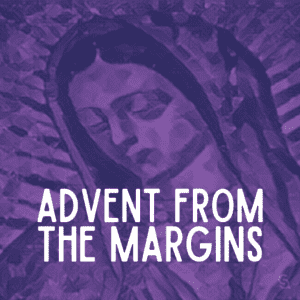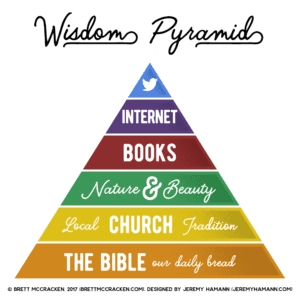 Advent is countercultural to the typical pageantry of many contemporary church routines that crescendo into Christmas Day. Instead of skipping directly to stories of Jesus’ birth, Advent holds our attention to the way Jesus intercedes in the history of humanity and ushers in new possibilities of light overcoming all darkness—not merely a spiritual darkness, either; rather, a tangible material liberation from all powers that marginalize. This expansive form of deliverance is not initially announced by Jesus—after all, he’s just a babe. The countercultural rhythm of Advent is carried by the brave truth sung by the prophetic voice of Mary.
Advent is countercultural to the typical pageantry of many contemporary church routines that crescendo into Christmas Day. Instead of skipping directly to stories of Jesus’ birth, Advent holds our attention to the way Jesus intercedes in the history of humanity and ushers in new possibilities of light overcoming all darkness—not merely a spiritual darkness, either; rather, a tangible material liberation from all powers that marginalize. This expansive form of deliverance is not initially announced by Jesus—after all, he’s just a babe. The countercultural rhythm of Advent is carried by the brave truth sung by the prophetic voice of Mary.
We find her story in the Gospel of Luke, Chapter 1. An angel visits Mary with stunning news: “You will conceive and give birth to a son, and you are to call him Jesus. He will be great and will be called the Son of the Most High” (v.31).
Jewish mothers of her time undoubtedly dreamed that their sons would one day grow up to be a savior and liberator for an entire nation. Mary is no different, and she receives confirmation that this dream would be reality with great joy.
She continues to describe a distinct picture of who God is:
“His mercy extends to those who fear him,
from generation to generation.
He has performed mighty deeds with his arm;
he has scattered those who are proud in their inmost thoughts.
He has brought down rulers from their thrones
but has lifted up the humble.
He has filled the hungry with good things
but has sent the rich away empty” (v.50).
Mary’s prophetic song levels a critique against the powers in her world. The proud will be scattered, the rulers brought down from their thrones. Her voice sings as Jerusalem languishes under occupation. The Roman empire is in full colonizing mode, taking land and assimilating people—including minority groups like the Jews. In this context, her song evokes the collective memory of her marginalized people and their dreams for liberation. Therefore, Mary’s reach for deliverance is not particularly unique, but how she imagines that liberation would come to pass is.
As Mary recollects the steadfast nature of God, she reflects back the news she received earlier in the story: her son will be the Son of the Most High. That means that as she voices her praise, she is not only describing God but simultaneously foretelling the type of liberation her son will inaugurate:
The rich will be sent away…the hungry filled…the humble raised up.
The four Gospel stories add details to corroborate Mary, offering clarity on what liberation through Jesus will look like. And this is where our Advent journey meets us today. The way of Jesus, where the hungry are filled, the humble raised up, the rich turned away, and the empires toppled, is not only distinctly non-violent (emulating his own non-violent atonement), but it also counters our common understanding of what power looks like, even today. The last shall be first and the first last—where does such an idea exist? It makes little sense to a world accumulating malformed power with hopes of supremacy and domination. This is why it is the church, a people with a renewed vocation on how to live in our world in a new way, where Jesus and his way of liberation for all ought to reside. But there’s a problem.
Many churches have rejected this vocation. Churches and denominations seek reach to collaborate with the empire, grasping and gnawing for last vestiges of political and social power. Yet the pursuit is distinctly anti-Christ when the accumulation of power comes at the expense of marginalized bodies. Indeed, to side with one is to oppose the other. Remember, it was the empire that sought to squash the rumor of Jesus when Herod sent out the edict to dispose of the children. It was the empire that nailed him onto the cross for his role as liberator. Today, an empire continues to oppose the work of Jesus where the rich will be sent away empty, the hungry filled, where the last shall be first.
This is why we need the voice of Mary, through the journey of Advent, to help re-orient our gaze to Jesus. Her song recalls a hope that rests on a God who sides with powerlessness. As we linger in the stillness of the dark during this Advent season, know that it is in the dark where God’s light sides.
Rohadi Nagassar is a writer, entrepreneur, non-profit developer, and pastor. He lives on Treaty 7 Land in Calgary, Alberta, Canada. He currently writes in the areas of anti-racist discipleship, diversity and inclusion, deconstruction, and decolonizing the church. His books include When We Belong: Reclaiming Christianity on the Margins, Soul Coats: Bible Themed Adult Coloring, Thrive: Ideas to Lead the Church in Post-Christendom, and #changethestory: A Short Resource on Dismantling Racism in the Church. Visit him at rohadi.com for more, including his podcast, Faith in a Fresh Vibe.


